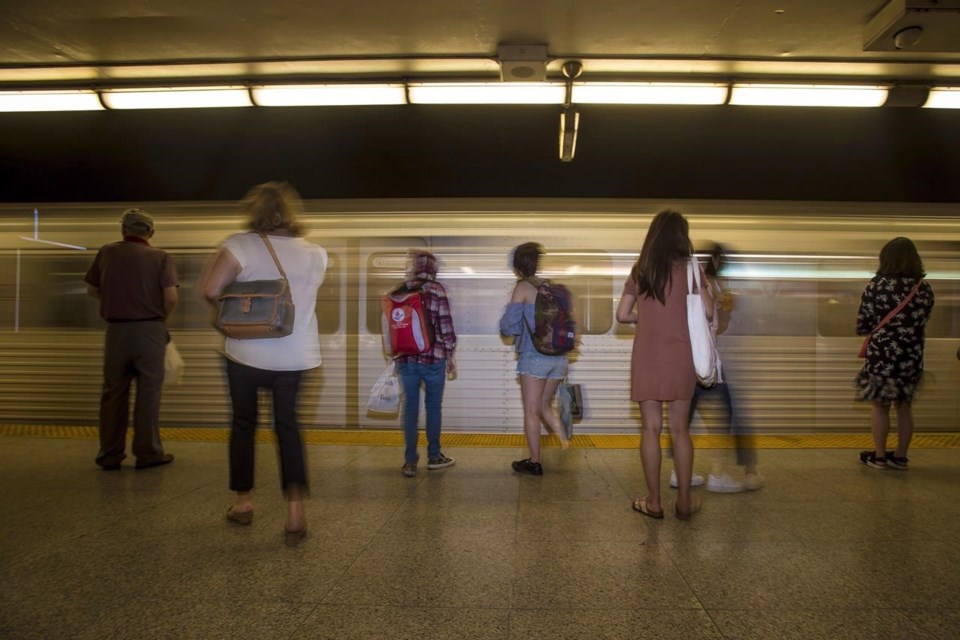TORONTO ÔÇö After tense negotiations and public sparring throughout the year, sa╣·╝╩┤½├¢'s major telecommunication carriers have reached a deal to offer wireless coverage on Toronto's subway system.
A spokesperson for Industry Minister François-Philippe Champagne's office said the companies reached the agreement on Thursday but declined to comment further.
In a statement, Rogers spokesman Cam Gordon said the terms of the deal could not be disclosed due to confidentiality.
ÔÇ£We stepped up to bring 5G to TorontoÔÇÖs subway system and committed from the start to work with other carriers to join the network on reasonable commercial terms," he said.
"WeÔÇÖre pleased that weÔÇÖve reached commercial agreements.ÔÇØ
Bell declined to comment on the deal, while Telus did not immediately respond to a request for comment.
The two companies wanted a joint build of the TTC's mobile network using a consortium model similar to that of Montreal's Metro, rather than the licensing fee model Rogers had proposed.
The issue came up after Rogers bought the network in April from BAI, which was contracted to build it in 2012 by the TTC but never managed to sign on any of the major carriers.
After acquiring the network, Rogers went about upgrading it, and in August gave its own customers a head start on using it when it activated cellular service in the busiest sections of the Toronto subway system, without a deal in place with the other carriers.
The federal government then mandated that Rogers give Bell and Telus customers equal levels of service on portions of the subway where there was existing cellular infrastructure that was concentrated downtown by Oct. 3, which it did.
Then last month, Rogers turned on wireless service for its own customers at all remaining Toronto subway stations plus tunnels between Sheppard West and Vaughan Metropolitan Centre stations ÔÇö again leaving its rivals to play catch up.
They now have, with Telus confirming Thursday it is now providing service "in all connected areas of the TTC."
"Now, customers can use their devices to stream content and keep in touch with friends and family while staying safe on transit," said Telus spokesman Richard Gilhooley.
Bell followed suit on Friday, saying that "as of today, Bell customers can now talk, text and scroll in all TorontoÔÇÖs TTC subway stations and in select tunnels."
"Going forward, our customers can expect access at the same time as RogersÔÇÖ customers whenever a new station or tunnel is added to the TTC network," said Bell spokeswoman Jacqueline Michelis.
Freedom Mobile confirmed its customers also currently have service in all TTC stations and an equal portion of the tunnel routes.
Ottawa's decision in September had given the carriers one month to reach a deal over wireless access on the TTC, or face a 70-day arbitration process to solve the matter. The deadline for a decision in that process was set for next Wednesday.
The progress was welcome news, said Shelagh Pizey-Allen, executive director of the TTCriders advocacy group.
"What was not acceptable was some cellphone users getting access before others," she said.
"The infrastructure's there. Everyone should be able to use it no matter who their provider is."
TTC spokesman Stuart Green said he didn't know of any details surrounding the deal, but that the transit commission was pleased to hear about it when contacted by a reporter.
"We welcome any agreement that brings more certainty to the ongoing rollout of wireless service that everyone has been working toward," Green said in an email.
David Soberman, a marketing professor at the University of Toronto's Rotman School of Management who follows the telecom sector, said the issue is both a matter of convenience and safety. He noted Toronto has lagged behind other big cities on the world stage when it comes to cellular access on public transit.
"It's something which people have in other big cities like Paris and London, for example. Why we shouldn't have that in Toronto?" said Soberman.
"Over the last year, we've had an increased number of aggressive events and assaults  I think we can collectively agree that from a societal point of view, it's an important safety issue."
All major wireless providers must offer full network access in every TTC station by June 2024, according to Champagne's office.
Voice, text and data service must be granted by the carriers in 80 per cent of subway tunnels by December 2025, and the entire system a year later.
Pizey-Allen agreed that the access riders have today to call, text or browse the web on portions of the subway line should have been available years ago, especially in a major city like Toronto.
"The public interest should come first," she said. "Transit riders' safety and feeling safe and connected in the subway tunnels should come first before corporate profit."
This report by The Canadian Press was first published Dec. 15, 2023.
Companies in this story: (TSX:RCI.B, TSX:BCE, TSX:T, TSX:QBR.B)
Sammy Hudes, The Canadian Press



